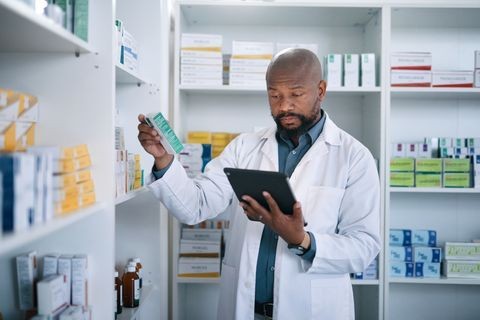Proposed Legislation Would Expand FDA Authority Over Counterfeit Medical Devices
Client Alert | 3 min read | 10.02.20
Counterfeit medical devices—medical devices that are falsely represented to be produced, packed, or distributed by another device manufacturer, packer, or distributer—are reportedly increasing in volume and sophistication. Recent reports of counterfeit diagnostic COVID-19 tests and N-95 masks demonstrate that the demands associated with the COVID-19 pandemic have only exacerbated supply chain vulnerability to counterfeit medical devices. In addition to putting patients at risk, counterfeit medical devices harm manufacturers and distributors of genuine devices in myriad ways: by damaging the reputation of the genuine devices, imposing costs to remove counterfeit product from market, and even posing potential product liability risks under certain circumstances.
To address at least some of the concerns posed by the introduction of counterfeit medical devices into the U.S. market, on September 21, 2020, the United States House of Representatives passed a bipartisan bill that, if enacted, would give the U.S. Food and Drug Administration (FDA) the authority to seize and destroy counterfeit medical devices at points of entry to the United States. In particular, the proposed legislation—the “Safeguarding Therapeutics Act of 2020”—suggests amendments to section 801(a) of the Food, Drug, and Cosmetic Act, which governs the FDA’s authority over imports and exports, that would give the FDA the same authority to destroy counterfeit medical devices that it already has to destroy counterfeit drugs.
Currently, section 801(a) explicitly authorizes the FDA to seize counterfeit drugs, and to destroy such drugs without permitting the owner or consignee an opportunity to export the product instead. In other words, the FDA has the authority to destroy counterfeit drugs that are shipped to the United States, thereby ensuring such counterfeits are removed from the supply chain and potentially deterring future illegal shipments.
Section 801(a) does not, however, explicitly provide for seizure of counterfeit medical devices, though they may be refused admission (as adulterated, misbranded, or otherwise not in compliance with regulatory requirements as any food, drug, device, tobacco, or cosmetic products could be). Further, unlike counterfeit drugs, even medical devices that are refused admission may not be destroyed unless the owner or consignee has first been provided the opportunity to export the product. Thus, under current law, counterfeit medical devices shipped to the United States are typically returned to the sender. Anecdotal reports suggest that such medical devices often remain in the U.S. supply chain. In some cases, counterfeit medical devices are repackaged before being shipped back to the United States. In other cases, they are shipped right back to the U.S. in their original packaging.
The FDA’s current lack of authority to destroy counterfeit medical devices is also thought to increase burden on federal workers at points of entry to the U.S. because workers must repeatedly identify and intercept the same counterfeit products. This burdensome and imperfect process often fails to ensure that counterfeit products are kept out of the U.S. and out of the hands of healthcare providers and patients. Additionally, the disparity between the FDA’s authority as to counterfeit drugs and the FDA’s authority as to counterfeit medical devices may enable shippers to avoid having counterfeit drugs destroyed simply by attaching them to a medical device. For example, a counterfeit vaccine that would otherwise be a drug subject to destruction by the FDA can be shipped pre-filled in a syringe. Under the current regime, because the syringe is a device not subject to the FDA’s destruction, the pre-filled syringe would have to be shipped back to the sender. The Safeguarding Therapeutics Act of 2020 would eliminate this disparity in the FDA’s authority to handle counterfeit drugs versus devices, by allowing the FDA to destroy counterfeit medical devices the same way it can already destroy counterfeit drugs.
The Safeguarding Therapeutics Act of 2020—and the governmental focus on counterfeit medical devices that it signals—warrants the attention of manufacturers and distributors of genuine devices. If enacted, the Safeguarding Therapeutics Act may reduce the number of counterfeit devices that make it into the United States market. This has obvious benefits for manufacturers and distributors of genuine devices.
But the FDA interception and destruction of counterfeit devices is unlikely to solve the problem alone. Indeed, Congress’ current focus on counterfeit devices counsels that companies who sell genuine medical devices would be well-served by taking the time now to ensure the sufficiency of their own anti-counterfeiting measures, e.g., by securing supply chains, tracking or marking genuine devices, and / or having adequate systems in place to properly report suspected counterfeits. By doing so, companies can make it more difficult to counterfeit in the first instance and help to ensure that the FDA and others are able to distinguish between counterfeit and genuine devices. As added incentive, good anticounterfeiting measures can pay dividends if and when a company who sells genuine devices becomes embroiled in litigation regarding a potentially counterfeit device by making it easier to identify and demonstrate the existence of a counterfeit product and showing that any legal duties to prevent counterfeiting were discharged.
Insights
Client Alert | 4 min read | 04.10.25
Hikma and Amici Curiae Ask Supreme Court to Revisit Induced Infringement by Generic “Skinny Labels”
In Amarin Pharma, Inc. v. Hikma Pharms. USA Inc., C.A. No. 20-1630 (D. Del.), brand manufacturer Amarin brought an induced infringement claim against Hikma’s generic icosapent ethyl product, which lists Amarin’s Vascepa® as the reference listed drug. Vascepa was originally approved by the U.S. Food and Drug Administration (“FDA”) to treat severe hypertriglyceridemia, and later, Amarin obtained patents and approval for Vascepa as a treatment to reduce cardiovascular risk in certain patient populations. Hikma’s Abbreviated New Drug Application (“ANDA”) for generic icosapent ethyl included a Section viii statement that Hikma was not seeking approval for the patented cardiovascular indication along with a “skinny label” that included only the indication for severe hypertriglyceridemia.
Client Alert | 1 min read | 04.09.25
Client Alert | 12 min read | 04.09.25
Client Alert | 4 min read | 04.07.25




